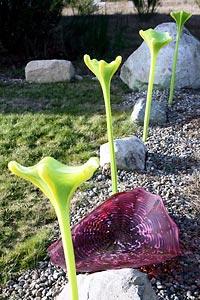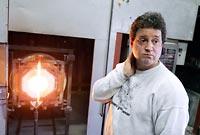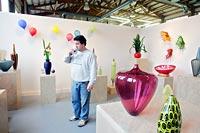 |
|
|
|
|
|
|
Thursday, April 29, 2010 - Page updated at 02:47 PM Chihuly turns up the heat on competing glass artistsSeattle Times staff reporters When glass artist Dale Chihuly filed a copyright-infringement suit against two glassblowers last year, his friends and acquaintances were almost apologetic. Such a hard-nosed tactic, they said, was unlike Chihuly, who once ran his business as an extension of his family. They wondered if the artist had been influenced by advisers. Chihuly offered no such excuses, explaining, "We're not going to go after somebody unless it's pretty serious." The copyright suit may be an extreme case of Chihuly protecting his multimillion-dollar empire. It's certainly the most visible. But it's not the only time he's played hardball with other artists. For years, Chihuly and his associates have used a combination of personal confrontation, legal threats and quiet influence to keep other artists from making or selling work they felt was too similar to Chihuly's. They've sent letters to glassblowers telling them to stop, attended exhibits to call out pieces that resembled Chihuly's style, and persuaded gallery owners to relegate competing works to the back room — or stop selling them altogether. Few would question Chihuly's right to protect his business and his ideas, but in a world where most artists eke out a living and strive for one or two gallery shows a year, many have questioned whether he's gone too far. Chihuly has copyrighted dozens of works that his critics say use shapes, techniques and colors that are hundreds of years old. He has trademarked not only his signature but also the names of glass series such as "Persians," "Floats" and "Baskets." And he has required employees and contractors to sign increasingly stringent documents promising they won't ever disclose anything about Chihuly or his business operations — and agreeing to limit their work opportunities for five years after leaving his shop. If Chihuly hoped the agreements would shield him, the scrutiny brought about by his lawsuit has had the opposite effect. Chihuly and one of the glassblowers, Bryan Rubino, are negotiating a possible settlement. But the other glassblower, Robert Kaindl, said Monday he has no plans to settle and added: "I am going to expose absolutely everything about Chihuly's business practices to absolutely everyone." Crackdown on copycats
Chihuly's efforts to keep people from copying his work have expanded as his franchise has grown. His reputation — and the price of his art — took off when his ambitious project to hang glass chandeliers in Venice was featured in a Public Broadcasting Service documentary in 1998. With success came a new set of problems: Other artists began copying his work, and some galleries ripped him off, selling work without paying him and falsely reporting that some of the pieces they sold had broken. With the higher stakes, Chihuly Inc. got bolder about dictating what other artists could do and what galleries could sell. In August 2000, Chihuly's lawyer threatened legal action against a glass artist working alone in the woods in Arkansas after a Chihuly client noted that a chandelier pictured on one of the artist's fliers was "quite similar" to Chihuly's work. The glass chandeliers contained two shapes, corkscrews and balls, that Chihuly also used in his chandeliers. Chihuly's lawyer told the artist in a letter that the studio was "concerned that the public may confuse your chandelier replicas with Chihuly originals." "To avoid any potential copyright infringement and future litigation, we request that you immediately cease and desist the advertising, creation and sales of chandeliers that resemble those created by Chihuly," the letter said. Chihuly's lawyers dropped the matter when the artist, through his attorney, noted that his pieces were much smaller than Chihuly's, were lit from the inside instead of externally, and had evolved from original ideas the artist could document. The artist asked that his name not be used because he has no beef with Chihuly and cannot afford to get into a legal battle with him. Last year, the Arkansas artist earned an estimated $130,000; in 2004, Chihuly's earnings were estimated at $29 million, according to Dun & Bradstreet. Confronting other artists Tom Landowski, a former manager of Foster/White Gallery, a Pioneer Square gallery that has represented Chihuly since 1978, said Chihuly's collaborators have personally confronted artists they thought were poaching Chihuly's designs. He remembers Parks Anderson, a Seattle sculptor who has worked with Chihuly for nearly 20 years, once complaining to the gallery's owner about artists working at the Glasshouse Studio, a combination hot shop and gallery then downstairs from Foster/White. "There used to be people at the Glasshouse doing stuff that looked like Dale's, and Parks would just march in there and tell them to stop," Landowski said. Anderson did not respond to interview requests. Christopher Sternberg-Powidzki, a co-owner of the Glasshouse Studio, recalled Chihuly's hot-shop manager coming in "really pissed off" to protest the shop displaying a piece that resembled "a Chihuly." "I've never seen anything Chihuly has done that had the same hardware, but the technique was very similar," said Sternberg-Powidzki, who described the piece as a group of suspended bowls or basket forms. "Once we were informed, we took it down. I thought it was pretty fair." While the studio was getting tough with outside artists, it also was tightening up its own shop. A confidentiality agreement that Chihuly required employees to sign in the mid-1990s morphed over several years from a single page into six pages. Among other things, the agreement bans employees from badmouthing the artist, his work or his business. Chihuly said he was unfamiliar with the details of the agreement but said a lawyer told him even the current agreement was too lenient. "I just don't want people to copy my work, and that has happened many times over the years," Chihuly said. "But we try to stop it." Asked how, he replied: "Hardly at all. I mean, somebody's been talked to, maybe in a brief conversation." Uncharacteristic actions Chihuly's suit against the two glassblowers — along with four galleries that sold their work — represents a break from the past, when his concerns were handled privately, according to Chihuly's longtime friend Kate Elliott, a Seattle-area art dealer who still consults for him. Before last year, the only lawsuit he had filed in federal court or in Washington state court was an insurance-related claim in 1998. The copyright suit, filed in October in U.S. District Court, accuses glassblower Rubino, a longtime collaborator of Chihuly's, and businessman/artist Kaindl of collaborating in a scheme to make and sell knockoffs of Chihuly's work. Both have denied the allegations, and have filed counterclaims alleging that Chihuly is seeking to claim ownership of basic forms, shapes and colors that are fundamental to glassblowing. While there are certainly those who support Chihuly, the suit has spawned rare personal criticism of him by others involved with glass art. And the farther from Chihuly's Northwest roots, the harsher the comments. Frank Andrews, a Scotland glass expert, said there is nothing wrong with artists making work that is similar to Chihuly's as long as they put their own names on it. "There is no way that this should be being considered as copying," Andrews wrote on glass-time.com, a Web site for artists and collectors. "In my opinion the effort to prove it so has an unpleasant taste associated with only one emotion, greed." Chihuly, in a written statement, countered that the suit is about artistic integrity. "I am not trying to keep others from getting their inspiration from sea life or from nature," he wrote. "I take issue with people copying my artwork directly. ... I've had an overwhelming amount of support from the glassblowing and arts communities for which I am very grateful." That an artist who sells millions a year in glass art, prints, drawings, paintings, books and movies would suddenly resort to a legal battle has given rise to theories about why. "He let somebody talk him into it," said Elliott, who has known Chihuly since the 1970s. Chihuly, who is bipolar, was steeped in a depression last year when corporate advisers began pushing for the suit, Elliott said: "It's not really his style to do that. He left it up to some of the people who make decisions for him, and it got out of hand." The inner circle From about 1999 to 2003, Chihuly cut his staff by about a third and turned to those closest to him: his board of directors and William "Billy" O'Neill. A one-time sandwich-shop owner, O'Neill met Chihuly in 1999 and began working for him soon after, as the artist's yacht captain, driver, personal assistant and consultant. He formally joined the staff of Chihuly Inc. and Portland Press, Chihuly's publishing arm, in 2001. But before then, O'Neill had approached Rubino and another former Chihuly employee about starting a glass-art business that would make big colorful pieces like Chihuly's, said Rubino and the employee, Robin Stark. Rubino also said that O'Neill wanted to attract investors by giving them copies of Chihuly's work as gifts. Rubino said he finds it ironic that he is now being sued for making work like Chihuly's — the very thing O'Neill had asked him to do. O'Neill said he met with Rubino and Stark sometime in the 1990s, when he was attending the University of Washington, teaching gym and coaching soccer. Initially, he said he didn't recall the exact reason for the meeting. But later he said that he had been approached about investing in a glassblowing business that Rubino wanted to start. The meeting, he said, was facilitated by Stark, who lived on a boat in the same north Lake Union marina as O'Neill and worked for Chihuly. "I didn't know who Dale Chihuly was in '97, '98 or, for that matter, '99," O'Neill said. "My version of artwork before meeting Dale was a Farrah Fawcett poster." Replied Rubino: "How could you live in Seattle, Washington, and live that close to the studio and have a relationship with a guy who works at Chihuly's studio and not know who Chihuly is?" Rubino and others who have questioned why Chihuly would pursue litigation have noted that the copyright lawsuit was filed by O'Neill's lawyer wife, a Notre Dame graduate who has practiced for four years. Kari O'Neill, who works for a Seattle firm that specializes in copyright law, aggressively pursued the claim against the glassblowers, even going to Kaindl's ex-wife's house to see if she had examples of his work they could use as evidence. O'Neill said Chihuly's company selected her firm after soliciting several proposals, and that her familiarity with Chihuly's business probably helped. As a salaried associate, she did not gain financially from the selection, she said. Kari O'Neill and her firm, on their own initiative, withdrew from the suit earlier this year, she said. O'Neill filed another suit for Chihuly last year against a gallery owner in Hawaii, after the owner claimed he was owed commissions. That suit, filed before the copyright claim, demanded the return of about $1.8 million worth of Chihuly's work. Without the artist's work, the gallery closed. Its owner, Doyle LaCount, has since filed fraud complaints against Chihuly with state and federal authorities and launched a vitriolic Web site attacking Chihuly, his business and his artistic practices. Billy O'Neill said he convinced the site's Web host to take the site down about two weeks ago when LaCount's attacks on him became too personal. In bringing the suit against Kaindl, Chihuly is going after a more ambitious, well-funded competitor. Less than two years after Kaindl started his business, Art Glass Production, he was selling art at Costco, the Seattle Home Show and in local galleries and showrooms around the country. Like Chihuly, Kaindl can blow glass but relies on other glassblowers to make the bulk of his creations. And like Chihuly, Kaindl opens doors with his charisma, former associates said. Kaindl, 46, of Redmond, became something of a pariah in the glass community in 2004, when he started the custom art-glass business in Kirkland. Area glassblowers, who began complaining about his business practices as early as 2001, said Kaindl's Web sites implied that he would copy other artists' work and undercut their prices. Kaindl said he was making reproductions, but only of antique works. "I do not condone the copying of other artists' work," he said. He also denied charges that he doesn't blow glass, saying he has made glass professionally for about four years. Kaindl had rented Rubino's crew and studio, along with two other studios, when he was trying to win the contract to supply Costco with glass art. "Once they get the rhythm going, they can spin out 40 big macchia [spotted-glass] pieces a day. That's prolific," said Port Orchard glassblower Scott Curry. Curry said he partnered with Kaindl on a glass business but that the two parted over issues of money and trust in 2005. When they were working together, Curry said, Kaindl brought him a book of Chihuly's botanical sculptures and asked Curry to copy them. Curry said he refused. When he learned that Chihuly was considering a lawsuit against Kaindl, he told the story to Chihuly's lawyers. Asked about the alleged incident, Kaindl replied: "That absolutely did not happen." Countering Chihuly's suit Kaindl claims that Chihuly is using the courts to intimidate him and put him out of business. He said in a counterclaim filed in May that the suit destroyed his business relationships. He alleged Chihuly wasn't involved in designing, creating or even signing a "substantial number" of his works. The accusations, which Chihuly has denied, have bounced around the globe in news stories and on message boards for glass artists. Curry said the suit will ultimately hurt Chihuly, not Kaindl. "Robert's saying the same things that people have said all along: [Chihuly] doesn't sign those pieces and he doesn't make those pieces. Robert's exposing that." Whether the publicity from the suits will tarnish Chihuly's reputation long-term remains to be seen. Since Kaindl's allegations surfaced, Chihuly has been smiling for the cameras, inviting the media to his studio and staging events that seem designed to remind people of his accomplishments. He even threw out the ceremonial first pitch at a recent Seattle Mariners game. It's a stark contrast to his absence in recent years as he struggled with his bipolar disease. And while many agree that Chihuly has the right to protect his franchise, some wonder why he needs to. "He has an unassailed position of honor in the history of glass," said New York glass dealer Doug Heller, "but at the moment he's not the most popular guy in the community from which he came." Seattle Times researchers Gene Balk and David Turim contributed to this report. Susan Kelleher: 206-464-2508 or skelleher@seattletimes.com. Sheila Farr: 206-464-2270 or sfarr@seattletimes.com. Copyright © 2006 The Seattle Times Company Most read articles
|
Seattle Times Special
Miracle Machines: The 21st-Century Snake Oil
The Favor Factory
Confronting Malaria
Pike Place Market
Your Courts, Their Secrets
License to Harm
The Bering Sea
Olympic Sculpture Park |














